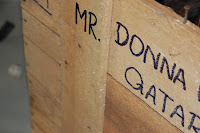It's time for me to come clean: I know you're reading this. Well, not you, specifically, but that someone is. I have a website linked to my blog to see how many people visit, and where that traffic is coming from. It's interesting to see if anyone is tuning in, and where they are. But don't worry. The most I know about you is your city, sometimes only your country. I don't know your name, email address, or physical address. Except for that guy who sits in his basement and checks to see if I've posted anything lately. I keep telling you, Dad...I'm on it.
Last week I noticed a hit from a Google search that someone did from Mumbai, India. This is what the person Googled:
"i don't know driving but is it ok to learn it in doha"
No, sir. No it is not ok.
I spend a lot of time in the car, mostly acting in my role as Unpaid Family Chauffeur. My working conditions are deplorable. Drivers cut me off in roundabouts, men going far faster than me pass me on the right, and I get stuck behind slow-moving vehicles all the time. I often think I should write about driving in this city. But the fodder for that post is too deep and too thick, so I think it's best to write little bits at a time, if only to prevent my eye from twitching.
I spend a lot of time in the car, mostly acting in my role as Unpaid Family Chauffeur. My working conditions are deplorable. Drivers cut me off in roundabouts, men going far faster than me pass me on the right, and I get stuck behind slow-moving vehicles all the time. I often think I should write about driving in this city. But the fodder for that post is too deep and too thick, so I think it's best to write little bits at a time, if only to prevent my eye from twitching.
For this entry, let's concentrate on the driving school in my neighbourhood. This school has a collection of little brown and mustard-yellow cars with big red "L's" stuck with a magnet on the back. My kids asked me what the L stands for. I told them: "Learner". When I'm behind one I mutter another L-word under my breath. (Not a bad word, but it might be a little impolite. Think fingers in the shape of an L on your forehead.) These cars always have two people in them, the Learner and the Instructor. They are always both expats. Chances are high that the Learner has come to Doha to get a job as a driver. Chances are also high that he has never before been behind the wheel of a car.
The beauty of having this driving school right in my very own neighbourhood is that I get to encounter these little cars and their drivers frequently, and collect quite a few data points about them and their habits. Here is what I've managed to piece together so far:
1. The Instructor's arrival in Doha preceded the Learner's by about two and a half weeks.
2. The Learner is incapable of looking over his left shoulder, and
3. If there is an employment sector in Doha whose remuneration is solely Danger Pay, the Instructor may very well be the highest paid man of this sector in the city, next to the guy at Carrefour who won't let me return my faulty blender.
It must be a joyous undertaking having a fellow-countryman teach you to drive in a foreign country. You speak the same language. You're comfortable in each other's company. You both have an affinity for under-shooting the posted speed limit by a good 30 per cent. And culturally, you both think that checking your blind spot is for sissies.
But I fear we may be reaching a Dark Age of driving in Doha. Those with seemingly little experience (or maybe just not enough knowledge of how they make the rest of us crazy) teach new expats to drive, and they in turn teach others to drive, and so on, into perpetuity, until soon no one who has attended a driving school will even know what the colours of the traffic lights mean. If that's true, then things on the streets of Doha will only get worse. It may already be too late. I saw this printed on a card hanging from a rear-view mirror just the other day:
The Pledge of the Driving School Graduate
I will go 70 in a 100 zone because I fear the awesome power
of this Nissan Sunny.
Why merge when pulling blindly out into traffic
is so much more exciting for everyone?
The roundabout is mine. All mine.
I will ignore the woman in the white SUV behind me,
who is honking and gesturing wildly.
My English is not great, and I have trouble hearing her, but I can read her lips.
I think she just called me a Learner.
I will go 70 in a 100 zone because I fear the awesome power
of this Nissan Sunny.
Why merge when pulling blindly out into traffic
is so much more exciting for everyone?
The roundabout is mine. All mine.
I will ignore the woman in the white SUV behind me,
who is honking and gesturing wildly.
My English is not great, and I have trouble hearing her, but I can read her lips.
I think she just called me a Learner.













